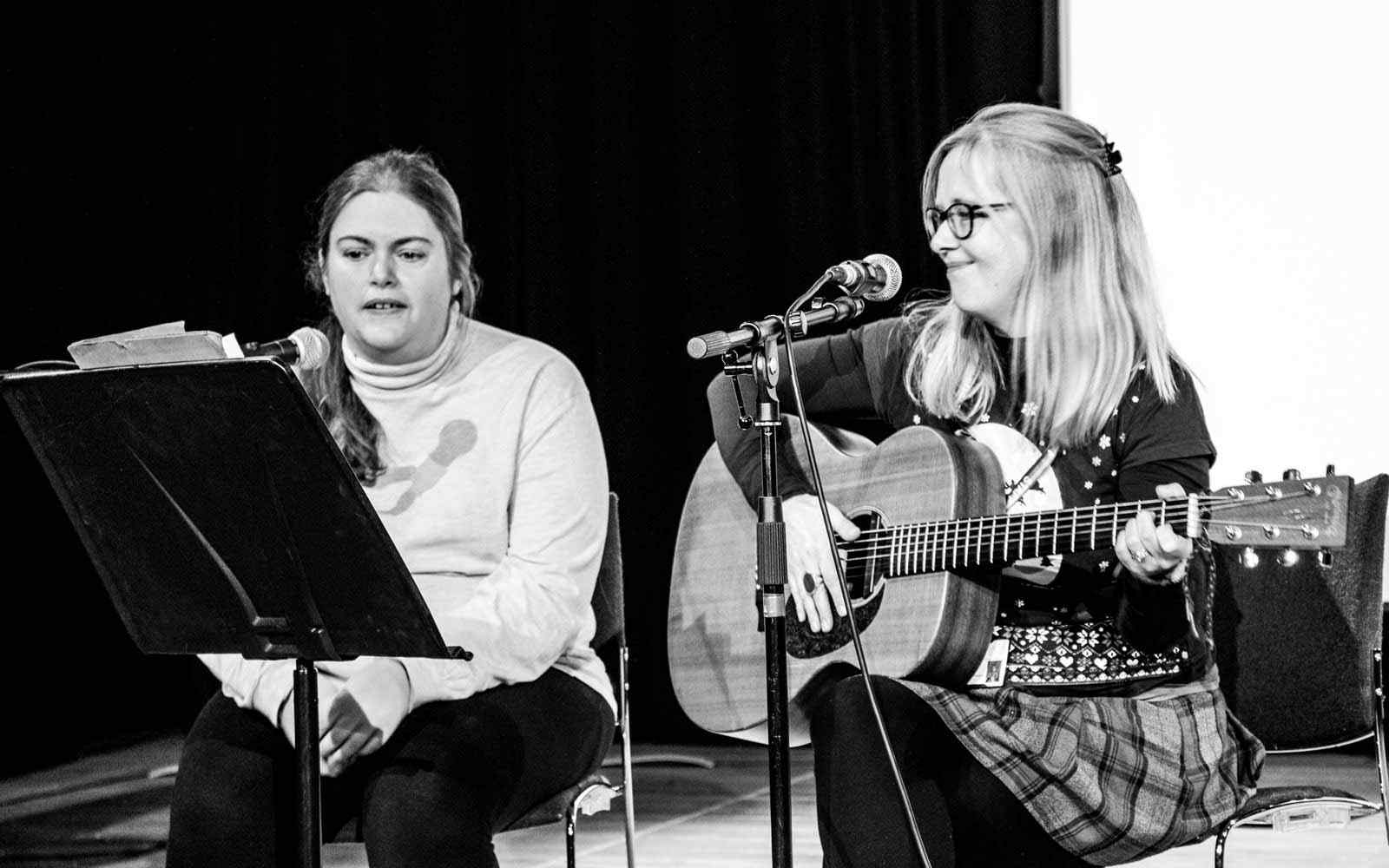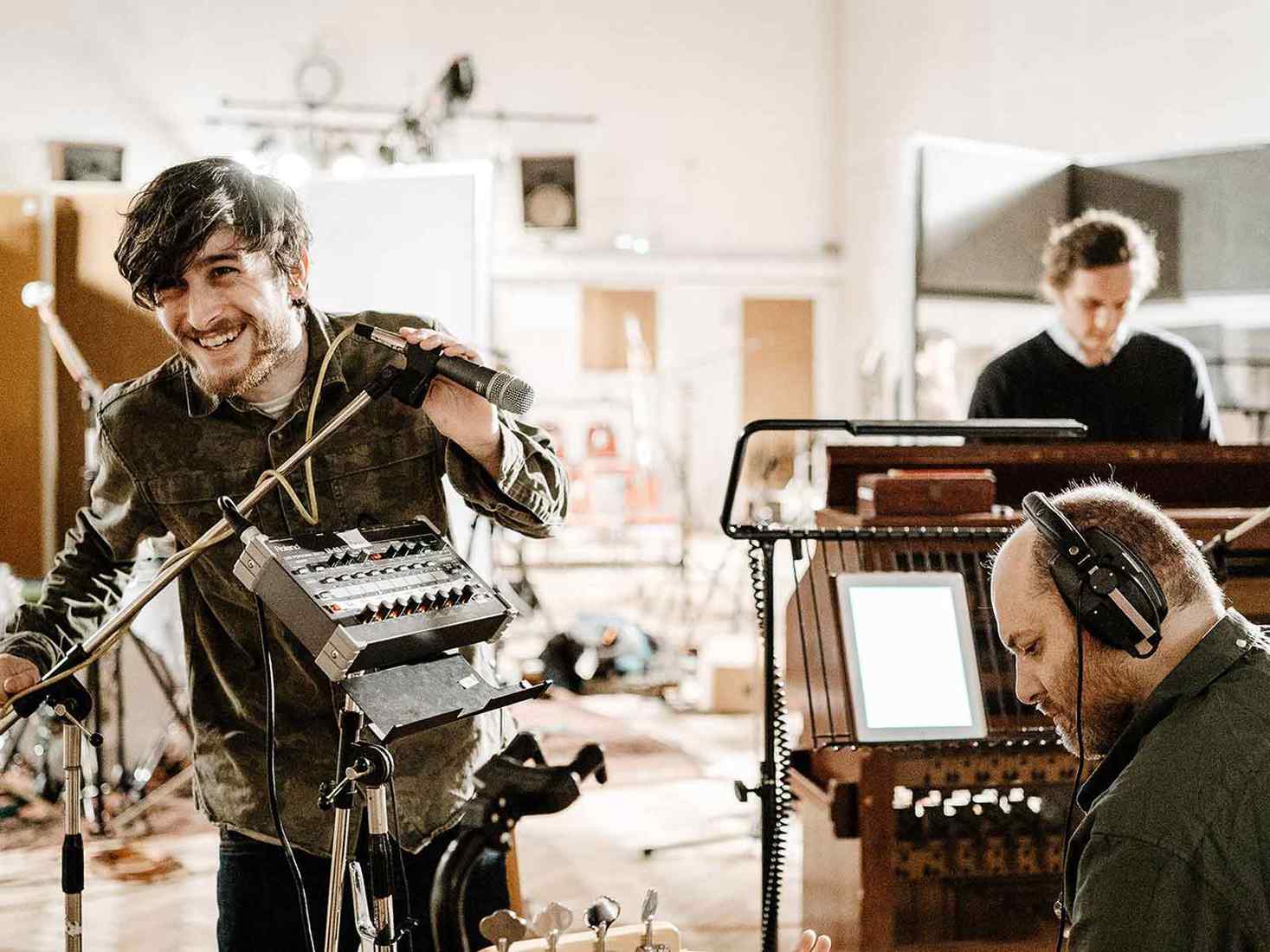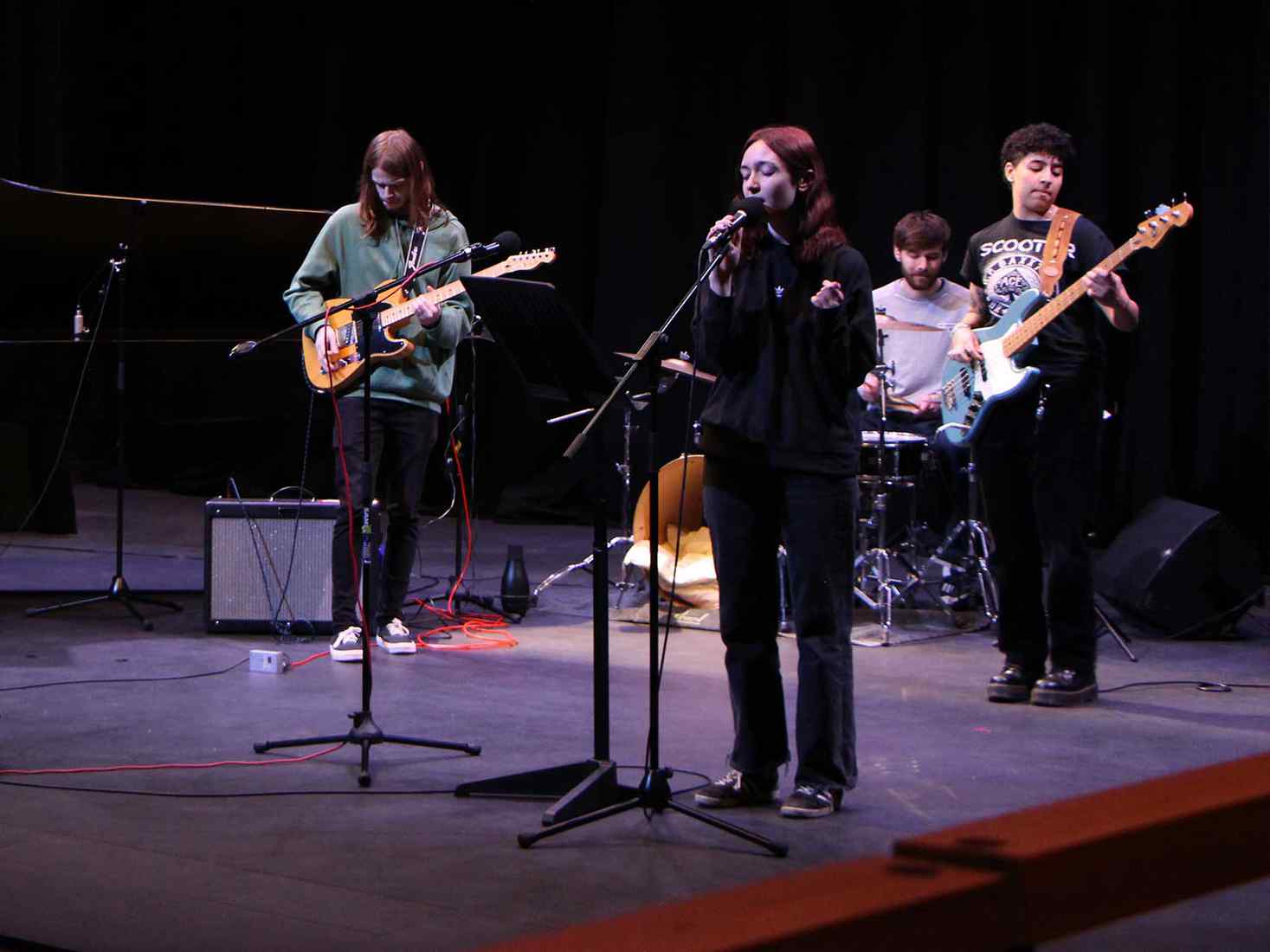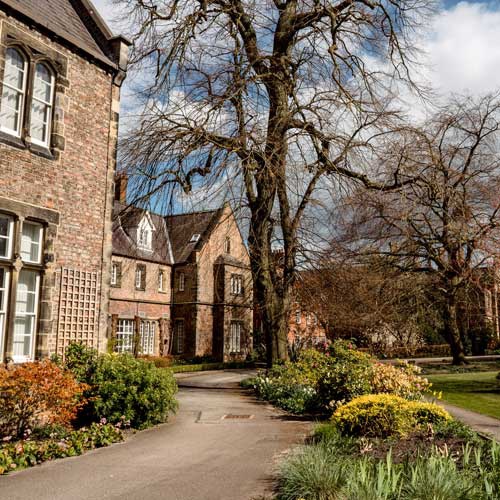Postgraduate Course
Musical Leadership MA
Become a musical leader who can adapt to any ensemble scenario, strengthening your ability to develop and prepare ensembles in any context.

Build on your existing skills in leading ensembles in this practical and critical course. Through evaluation and critique, you will establish bespoke strategies for working with ensembles that resonate with their genre, goals, demographics, instrumentation, cultural location, and more. Learn how to craft specific responses to the needs of your ensembles, including a range of rehearsal strategies.
York campus
- Duration – 1 year full time, 2 years part time
- Start date – September 2024, September 2025
- School – School of the Arts
Minimum entry requirements
2:2 honours degree in a related subject
Interview and a brief presentation
Tuition fees
UK 2024-25 £8,000 full time
International 2024-25 £11,300 full time
Course overview
On this course you will focus on building your ability to analyse the context of an ensemble, to apply effective strategies in leading an ensemble, and to reflect on your practice. The ensembles you will specialise in are determined in relation to your own professional activity.
This could include groups you already play in or lead regardless of the genre or social context. You will be supported in running ensembles with the musical community at York St John University, which may provide opportunities to expand your practice.
Working with colleagues on the Musical Leadership MA will challenge your understanding of how leadership may be expressed. Across genres and contexts conductors, lead guitarists, teachers, and workshop leaders all learn from each other.
Throughout the course, you will have access to specialist resources and spaces at the University, including specialist rehearsal and acoustic spaces in our new Creative Centre. All your modules are driven by your own unique professional aspirations.
Musical leaders can be found on stages, in classrooms, in churches, in recording studios, and across our communities. This course is designed to help you develop the skills necessary to refine and adapt your practices.
The aim of the course is to help you establish an approach towards ensemble leadership that allows you to make the most of whatever opportunities present themselves.
Course structure
How you will study
You can study this postgraduate course full time or part time. This allows you to fit your studies around other commitments.
If you choose to study full time the course will take 1 year to complete. You will study:
- 3 compulsory modules (1 of which is the year long Independent Project module)
If you choose to study part time the course will take 2 years to complete and the modules will be split across both years.
The Independent Project module is carried across the whole of the course for both modes of study.
You can find out which modules are available in each semester on the Course Specifications.
Modules
Credits: 20
Compulsory module
Explore and test the connections between theory and practice. On this module you will investigate concepts and methods of practice-based research through lectures, critical discussion, and reflective engagement with your own practice. You will consider how knowledge can be generated, questioned and communicated.
Credits: 40
Compulsory module
Critique how strategies used to lead musical ensembles might be impacted by a variety of factors, both musical and non-musical such as:
- Musical genre
- Instrumentation
- Repertoire
- Demographics
- Ensemble goals
You and your peers will likely have a range of musical backgrounds, including classical, jazz, pop, and folk music. Taking this into account, you will learn from one another and expand your toolkit of leadership strategies. Our academic team will work with you specifically to extend your ability to critique and respond to varying ensemble contexts.
Credits: 120
Compulsory module
The weight of the award lies firmly in this module. You will engage with the production of a significant work or body of works that represent the culmination of your skills, knowledge and creativity. Along with this body of practice you will develop reflective, critical and contextual work that articulates and communicates an understanding of your practice. Project examples include:
- Leading a single ensemble through a series of performances and recordings.
- Leading multiple ensembles which contrast each other in terms of genre, content and skill level.
This independent project is useful in helping you demonstrate what makes your particular approach towards musical leadership effective for the contexts that you work within. This project and course is not about making you a generic musical leader, but helping discover and express why you as a musical leader are unique and effective.
Teaching and assessment
Teaching and learning
Within modules, teaching will consist of a mixture of group seminars and individual tutorials.
As a graduate student, independent learning will be central to your study. You will be encouraged to take responsibility for your role in managing your own learning and its outcomes. Our Academic Support Team are able to provide help regarding written English, study, research and technology skills if required.
We keep our group sizes small so we can get to know your creative personality and support your aspirations. We deliver your modules through:
- Lectures and demonstrations
- Seminars and visiting speakers
- Individual and group tutorials
- Group critiques
- Group and individual presentations
- Visits to appropriate arts venues and performances
Our teaching draws on both our research and professional experience. This means your learning is informed by the most current thinking in the subject area. You can find out more about our research and backgrounds by visiting our staff pages.
Assessment
There are no formal examinations on this course. You will be assessed through live events and coursework, which will include:
- Presentation
- Workshop
- Essay
- Annotated reflective document
- Oral exam (Viva voce)
You will receive continuous informal feedback on works in progress through a combination of showings, discussions and written proposals.
Entry requirements
Qualifications
Minimum entry requirements
2:2 honours degree in a related subject
Interview and a brief presentation
The minimum entry requirements for this course are:
- A 2:2 degree in a related subject
- Interview and portfolio
If your degree is in an unrelated subject, but you can provide evidence of relevant professional experience, your application may still be considered.
International students
If you are an international student you will need to show that your qualifications match our entry requirements.
Information about international qualifications and entry requirements can be found on our international pages.
If English is not your first language you will need to show that you have English Language competence at IELTS level 6.0 (with no skill below 5.5) or equivalent.
Interview and portfolio
Entry onto this postgraduate course is subject to attending an interview.
At interview you will be asked to give a presentation which will:
- Demonstrate your readiness for graduate level practice
- Show evidence of your engagement with critical thinking
You will also be asked to complete a portfolio. This portfolio should show examples of previous and current practice.
We are happy to arrange interviews via Skype for overseas students.
Accreditation of Prior Experiential Learning (APEL)
If you do not have traditional qualifications, you might be able to provide evidence of professional experience in the subject as an alternative way to meet the entry requirements. This is called Accreditation of Prior Experiential Learning (APEL). Appropriate references and records of employment would need to be presented to support your case for admission.
Terms and conditions
Our terms and conditions, policies and procedures contain important information about studying at York St John University. You can read them on our Admissions page.
Fees and funding
UK 2024 entry
The tuition fee for 2024 entry to this postgraduate course is:
- £8,000 for full time study
- £4,000 for part time study
These costs apply to all UK, Jersey, Guernsey and Isle of Man students.
Postgraduate loans are available to help you pay for your master's course. Find out more about funding your postgraduate studies.
International 2024 entry
The tuition fee for 2024 entry to this postgraduate course is:
- £11,300 for 1 year of full time study
- £5,650 per year for part time study
These costs apply to all students living outside the UK.
Due to immigration laws, if you are an international student on a student visa, you must study full time. For more information about visa requirements and short-term study visas, please visit the International Visa and Immigration pages.
Find out more about funding your postgraduate studies.
Tuition fees
UK 2024-25 £8,000 full time
International 2024-25 £11,300 full time
Alumni Scholarships
If you are alumni of York St John University we have scholarships available to help you continue your studies.
Additional costs and financial support
Course-related costs
While studying for your degree, there may be additional costs related to your course. This may include purchasing personal equipment and stationery, books and optional field trips.
Accommodation and living costs
View our accommodation pages for detailed information on accommodation and living costs.
Career outcomes
Where could Musical Leadership take you?
This postgraduate degree could lead you to any number of careers within the music industry, or it could take you in a completely different direction, using the many transferrable skills you will develop.
This will give you an advantage in careers such as:
- Performing in ensembles
- Conducting ensembles
- Teaching music
- Recording music
- Community music
- Music therapy
Stand out from the crowd with postgraduate study.
Far fewer people have postgraduate degrees than undergraduate qualifications. This gives you something extra to set yourself apart in a competitive graduate job market. Those with a postgraduate qualification will earn an average of £8,000 a year more than those with only an undergraduate degree. (Department For Education Graduate Labour Market Report 2019)
Our careers service, LaunchPad, provides career support tailored to your ambitions. Through this service you can access:
- Employer events
- LinkedIn, CV and cover letter sessions
- Workshops on application writing and interview skills
- Work experience and volunteering opportunities
- Personalised career advice
This support does not end when you graduate. You can access our expert career advice for the rest of your life. We will help you gain the experience and confidence you need to succeed.
Course highlights
Build a professional network
Engage with our academics, visiting speakers and fellow students to build connections in your industry or academic discipline.
Collaborative practice
This course shares delivery of core curriculum and practice-led research methodologies with parallel Masters Degrees across the University.





